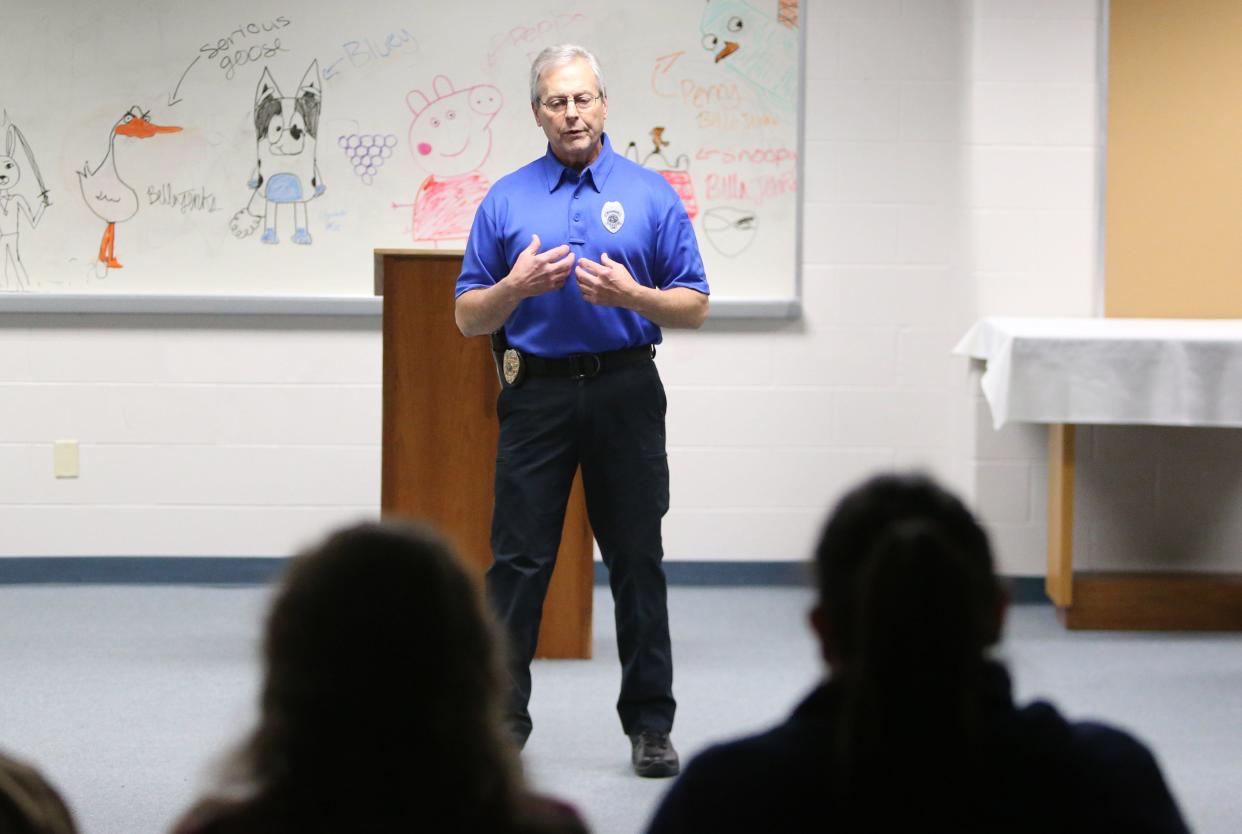Mishawaka sees 12-hour police shifts as the way to put more officers on streets

MISHAWAKA — The city police department moved to 12-hour shifts for its officers on the streets in January, and Police Chief Ken Witkowski and Mishawaka FOP Lodge 91 President Richard Freeman say the new schedule seems to be working.
Getting to this point is a case study in how police departments are dealing with the shrinking applicant pool for new police officer recruits while trying to maintain shift strength as older officers retire.
More: Mishawaka police to move to 12-hour patrol shifts on Jan. 1. With it comes pay increases.
At the monthly neighborhood meeting in February of 1st District Common Council member Dale "Woody" Emmons, the city's top cop and the leader of the local police organization touted the new schedule's effects:
● More officers on the streets per shift: In 2023, the Mishawaka Police Department had set 10 officers per shift by contract, but, officials said, they at times struggled to maintain it without overtime. This new shift structure can assure the department of at least 12 officers on the streets per shift, with more at times that can approach 14 to 16.
● Less mandatory overtime: As a way to maintain shift strength, the city paid out overtime that Witkowski said approached all-time levels of around $700,000. By giving officers the extra hours with the extra bump in base salaries, the overtime budget is drastically reduced.
● More hours worked per year and more pay: With 12-hour shifts, Freeman said, the 243 extra hours worked by officers amounted to a base officer pay of $89,000 annually. Freeman said that although it is more hours, officers have those hours built into their normal work schedules, with fewer last-minute mandatory overtime surprises.
● Less actual days worked for officers over a two-week period, giving every other weekend off: With a two-week schedule, officers will work on Mondays, Tuesdays, Fridays, Saturdays and Sundays in the first week and Wednesdays and Thursdays in the second week.
For Witkowski, any type of schedule where the public can be served with more officers in the neighborhoods while the officers can have successful lives with their families is one he hopes can continue.
In 2023, there were 114 officers budgeted for the 8-hour shift schedule. With the city and FOP working with a shift strength of 99 officers, the 12-hour shift schedule accounts for 80 patrol officers and 19 detectives, street crimes and administrative positions.
Witkowski said the department is seeing lateral transfers of police officers from other area departments and that with police academy recruits and word on other possible lateral transfers, he is hopeful to be able to attain full-force status.
"What we've seen in the first seven weeks of this year, we've been averaging 14 officers per day per shift working on the streets, up from 10," Witkowski told the group in February. With overtime in January 2023, the city spent about $50,000, but, the police chief said, it had spent less than $1,000 up to that point this year.
Witkowski said that although most officers favored the new shift schedule, some at first said it would not work with their family lives.
"But as we move forward into it, I've talked to at least two or three in the past couple weeks, and they say, 'You know what? It's working very well for my family. I like it,'" Witkowski said.
Last year, Witkowski said, they had part-time officers patrolling the parks. With the 14 to 16 officers on a shift this year, he said, he can redirect patrols to areas where they are needed without the expense and the disruption of having to call officers in for overtime.
"If we have an issue with a park or a neighborhood, we can take those people and put them in those neighborhoods to bolster the amount of officers you have and be more proactive," he said.
Freemen admits that even though the Mishawaka police force is not at its 99-person force, they're already seeing benefits from already having more officers on the streets per shift than in the past year or two. He cited statistics that show that with more people on the streets per shift, reductions in crimes will be seen.
"We're not even fully staffed now," he said. "Once that happens, this is going to be a win across the board for the people, too."
Email Tribune staff writer Greg Swiercz at gswiercz@sbtinfo.com
This article originally appeared on South Bend Tribune: Mishawaka begins 12-hour police patrol shifts

